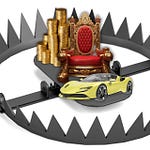A little learning is a dangerous thing.
Alexander Pope
You are no doubt aware of the series of megahit movies that started with The Matrix in 1999. Here is a brief overview for those who — due to a lengthy coma or prison sentence — remain somehow ignorant of the premise of the original movie: Sometime in the future, humanity has been linked en masse to a simulated reality called, you guessed it, “the matrix,” which is run by artificial intelligence. (As I wrote that sentence, I swear I heard Alexa giggle.)
Of course, no one inside the matrix realizes that their physical body is just part of some sort of giant battery. (Stay with me here.) Meanwhile, some lucky devils get to escape the horrid matrix, which overflows with the sumptuousness that marks what we call human reality. Instead they opt live to free in a dank underworld where they eat gruel that is literally gray and are constantly hunted by mechanical sentinels that look like squids, move like squids, and are commonly known as “squids.”
With such an alternate quality of life available, is it any wonder that few are ever tempted to snarf up those red pills? After all, who would want to escape a world — however artificial — of plenitude, indoor plumbing, and a visible sky, where colors range well beyond the grayscale and most squid encounters involve marinara on the side? Keanu Reeves maybe, but not this guy.
But I am getting away from myself. Pardon me. Alexa’s persistent cackling can be very distracting.
One of the things about the people who leave the matrix is that they can go back in due to a hole in the back of their heads. (Stay with me here.) They can also obtain whatever skill they desire instantly via this same hole. So, if you need to operate a helicopter on the fly (Alexa told me that joke) you can just plug in and download a handy helicopter manual into your brain. Soon you will be whirlybirding around the matrix without a care or a seatbelt. If you need to become a martial arts master, plug in, and with one press of a button you are soaring like Bruce Lee on a wire suspension system.
Now, I have never studied martial arts, but I was devoted to the TV show Kung Fu when I was a tyke. Therefore, I speak with some authority. I am quite sure that downloading a judo book does not make you a judo master any more than David Carradine made a credible Chinese monk. Sure, you would know some stuff about judo, lots of stuff, but don’t go knotting that black belt just yet. You have to be able to apply what you know.
Somehow, though, in The Matrix series, you not only know the moves and what-for of martial arts instantly through your posterior head hole, but you also become an expert practitioner, a master of all the intuitive aspects of the practice, such as anticipating your opponent or knowing when to kick and yell rather than yell and kick. What’s more, you can effectively fight someone who has long been an accomplished martial artist. Sure, they can still mash you into the floor, but you will get in more licks than you deserve to.
I call bullshit. I don’t believe more than half of that matrix stuff.
The fact is that knowing is not true learning. I can memorize a poem, know it cold, and not have a clue what it means. I could even memorize a poem in a language I do not understand. So what?
Understanding is key to learning.
Sure there are ways of classifying learning that are more complex and precise, but in the most conventional sense, you don’t have learning without understanding.
Knowing
➕ Understanding
______________________
LearningAdditionally, when it comes to learning skills, such as flying helicopters, acquiring new languages, driving cars, beating people up with your feet, or even writing, knowing and understanding must be augmented by a good deal of doing — i.e., practice.
Knowing
Understanding
➕ A Bunch of Experience
______________________
Skills LearningJust trust me on this one. You do not want to go joy-riding with a matrix head-hole-trained pilot who’s never actually been in a cockpit before. Wave politely and say, “no thanks, I’ll jump.”
A Little Learning
We often confuse knowing with learning. Alexander Pope famously wrote, “A little learning is a dangerous thing.” The idea is that if you have only a slight understanding of what you know, you may grow overly confident and screw up. Unfortunately you have probably more often heard people misquote Pope as saying “a little knowledge is a dangerous thing.” The difference is salient.
One thing I have observed over decades as an educator is that brains are not buckets to be filled with nuggets of knowledge. That is not what education is. That is not what learning is. There is a reason we pay teachers poorly to do thankless work and be treated like garbage. Teaching and learning involve complex processes that require expertise, experience, and massive patience. Learning is not listening to this lecture, reading that book, and memorizing another thing. Learning is certainly not plugging your brain into a computer and downloading manuals. (Quiet, Alexa!) Learning itself is a skill, one that must be taught through practice.
Politicians, pundits, and other creepy-crawlies often confound learning with bucket-filling in order to make a point or score a point. Don’t fall for it. Learning is complex. Learning is highly individual. Learning is inefficient. And learning is itself a vital skill we must master if we are ever to free ourselves from our horrid AI overlords so that we can live as liberated humans in fetid underground caves decorated in gray tones, contentedly savoring our gruel while fending off inedible squid.
Do you understand the difference between knowledge and learning? What degree of mastery do you have in the skill of learning?
You can better master the skill of learning at every level in order to foster change and innovation, and I can help. Click below for your free consultation.
Share your thoughts on this topic or participate in a discussion by leaving a comment below or by contacting me directly by email:
You’ll need to register with Substack to leave a comment, which is painless and free.
Please share this post on social media.
And don’t forget to click subscribe to have Tools+Paradigms sent weekly to your inbox. I look forward to hearing from you.
Intro and outro podcast theme music by LiteSaturation from Pixabay.













